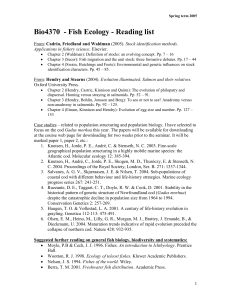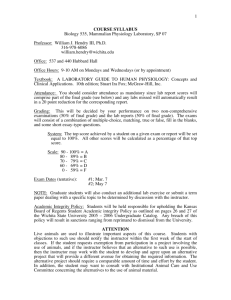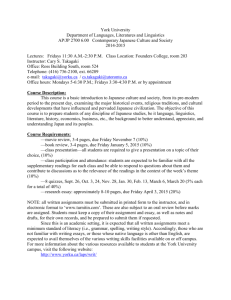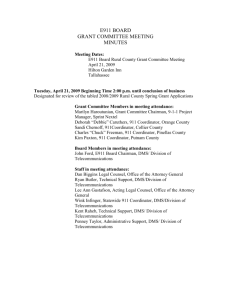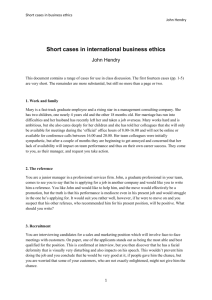Monday - University of Washington
advertisement
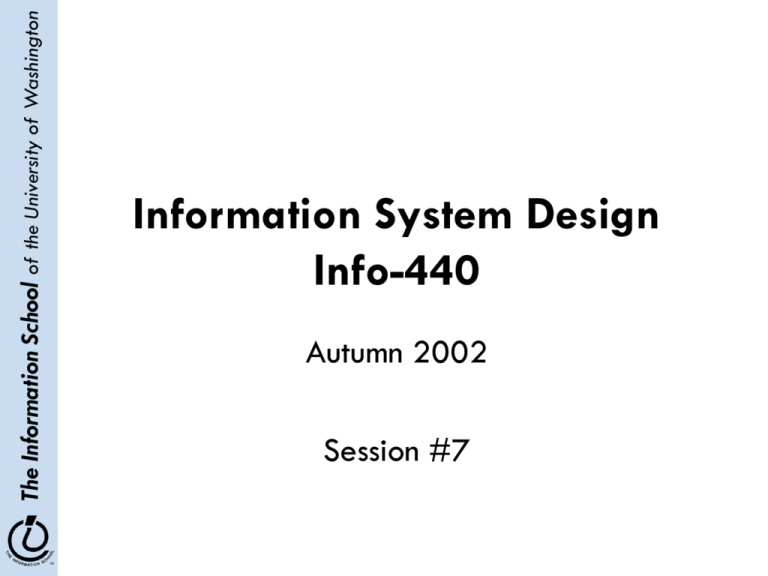
The Information School of the University of Washington Information System Design Info-440 Autumn 2002 Session #7 The Information School of the University of Washington Agenda • Admin • Last time: Reminder • Design spaces – Exercise • Task analysis – Exercise • Break! • Norman’s seven stage model • Task analysis process – Exercise Copyright David Hendry (INFO-440 session 7 - 10/21/2002) 2 The Information School of the University of Washington Admin • Announcements – – – – Thanks for attending Lou Rosenfield’s talk Jason Tabert’s note on Tablet PC event Check out Phil’s link to persona’s (Kim Goodwin) The non-designers design book in library reserve • Assignment #2 – Questions about taxonomy – Due: Wednesday • Interactive design project – Any questions? – Proposal due: Oct 28 • Quizzes – Back on Wednesday Copyright David Hendry (INFO-440 session 7 - 10/21/2002) 3 The Information School of the University of Washington Process: Where we are now? • • • • Week 1: Introduction Week 2: Requirements Analysis, Part I Week 3: Requirements Analysis, Part II Week 4: Conceptual design * Finish task analysis – Mental models; – Identifying & modeling concepts, entities, and relationships • • • • • • Week 5: Interaction design, Part I Week 6: Interaction design, Part II Evaluation Information design Process, project management The literature, personalities, and history Copyright David Hendry (INFO-440 session 7 - 10/21/2002) Labs: Prototyping 4 The Information School of the University of Washington Methods (so far) • Requirements analysis – – – – – – – – – – – – Affinity diagramming Card sorting Comics for summarizing workplace data Conceptual models (intro only) Contextual inquiry, concentrating on interviewing Design-space analysis (more today) Focus groups Inspecting objects (Norman’s vocabulary) Personas Scenarios Task analysis (more today) Trade-offs: Representation technique Copyright David Hendry (INFO-440 session 7 - 10/21/2002) 5 The Information School of the University of Washington Last time • Reviewed – Scenarios & Personas • Introduced – Design space • Introduced task analysis – Goals – Tasks/sub-tasks – Actions highJason Hamden Jeff Esther Heather’ Heather Ben Brian Chuck Theo Brianna low low Copyright David Hendry (INFO-440 session 7 - 10/21/2002) high 6 The Information School of the University of Washington Design Spaces The Information School of the University of Washington Cross dimensions & plot people, features or products • Steps 1. Invent two more dimensions 2. Plot items on grid (precision is not critical) 3. Go to 1 until plot seems to capture relevant differences – – Identify ‘holes’ in the design space Tactically decide where to focus attention Copyright David Hendry (INFO-440 session 7 - 10/21/2002) 8 TYPE Family Album Journal One splash page Pop Culture Small Business School/Education Chuck Heather Hamden Jason Esther Hamden Ben Chuck Hamden Esther Esther Ben Jason AUDIENCE Self Family Friends Organization Neighborhood COMPLEXITY Low …. High Copyright David Hendry (INFO-440 session 7 - 10/21/2002) Chuck TOOLS Site Builder, FreeForm/HTM FrontPage The Information School of the University of Washington Cross dimensions to plot people 9 The Information School of the University of Washington Cross dimension to plot products Calendar Homepage building Build E-mail Chat Talk Private Copyright David Hendry (INFO-440 session 7 - 10/21/2002) Public 10 Aggregate ACTIVITY The Information School of the University of Washington Generalize dimensions Photo Center Purchase Cheese shop Build Online Auctions Calendar Palm reader Show & Talk 0 Copyright David Hendry (INFO-440 session 7 - 10/21/2002) Public library 1 Talk radio 10 102 103 104 AUDIENCE SIZE 105 11 (high) Flow Challenges The Information School of the University of Washington Task complexity: The notion of ‘flow’ a3 a4 a1 a2 (low) (low) Skills (high) • Csikszentmihalyi, M. (1990). Flow: The psychology of optimal experience. New York: Harper Perennial. Copyright David Hendry (INFO-440 session 7 - 10/21/2002) 12 The Information School of the University of Washington Markets: Competitive Analysis Community-oriented Emotional/ Lifestyle Rational Copyright David Hendry (INFO-440 session 7 - 10/21/2002) Individualistic-oriented 13 The Information School of the University of Washington Task spaces/design spaces • • • • • Use to organize complex information Use to make comparisons between items Look for ‘holes’ and opportunities Precision is not necessarily important Very effective communication device Copyright David Hendry (INFO-440 session 7 - 10/21/2002) 14 The Information School of the University of Washington Task Analysis The Information School of the University of Washington Definitions • Goal – What needs to be accomplished? • Task/sub-tasks – A step towards completing the goal • Action – An atomic event Copyright David Hendry (INFO-440 session 7 - 10/21/2002) 16 The Information School of the University of Washington Tasks are hierarchical Goal Task Task Sub-Task Task Task Sub-Task Sub-Task Sub-Task Sub-Task Action Copyright David Hendry (INFO-440 session 7 - 10/21/2002) 17 The Information School of the University of Washington Task flows: Interesting tasks are usually procedural Goal start No Task Decision Yes Task Other path Task Task end Copyright David Hendry (INFO-440 session 7 - 10/21/2002) 18 The Information School of the University of Washington Symbols • Starting point/other information • A task • A decision point Yes No Copyright David Hendry (INFO-440 session 7 - 10/21/2002) 19 The Information School of the University of Washington Scenario Joe is a hotel receptionist. He takes reservations from the phone and in person • Develop a task flow for his process Copyright David Hendry (INFO-440 session 7 - 10/21/2002) 20 The Information School of the University of Washington Possible answer Goal: Satisfy consumers Make new Reservation Check a Reservation Change a Reservation Cancel a Reservation Guest contacts clerk Repeat No Get info on dates, room type, discounts/specials, etc. Check availability Does guest want to reserve? Re-try Yes Copyright David Hendry (INFO-440 session 7 - 10/21/2002) Book guest 21 The Information School of the University of Washington Re-try (continue) Re-try Does guest want different dates? Yes Repeat No Thank guest Reservation not made Copyright David Hendry (INFO-440 session 7 - 10/21/2002) 22 The Information School of the University of Washington Book guest (cont) Book guest Get name, address, etc. Explain guarantee & cancellation policy Does guest want guarantee? No Yes Get credit card info Thank guest Copyright David Hendry (INFO-440 session 7 - 10/21/2002) Repeat booking info & give confirmation # 23 The Information School of the University of Washington Summary • Task analysis is a huge topic – Extremely detailed analysis of individuals (e.g., fighter pilots) – Workflow analysis of complex social situations (e.g., relations between doctors, patients, and insurance companies) • For more on tasks, see (a very good ‘how-to’ book) Hackos, J. T. & Redish, J. C. (1998). User and task analysis for interface design. New York: Wiley. Copyright David Hendry (INFO-440 session 7 - 10/21/2002) 24 The Information School of the University of Washington Norman’s stages of action The Information School of the University of Washington * 7: Making senseI see the equation and it looks okay. I’ll move on 6: InterpretationI opened the sheet and selected the cell with the formula in it Gulf of evaluation 5: Perception Pointer over icon, icon highlighted, etc. Gulf of execution 1: Goal - There is a problem with the budget. Need to check revenue model Copyright David Hendry (INFO-440 session 7 - 10/21/2002) 2: Task - Open 3: Actions plan - 4: Execution Excel Point at the Excel Grasp mouse, spreadsheet icon, point at cell, etc. click, inspect formula * From Rosson & Carroll 26 The Information School of the University of Washington Summary • You’ll see this model referred to frequently • Very detailed view of a single user • Breakdowns can occur when moving through each of these seven stages – The (domain) goal may be clear, but the (system) task unknown – The action plan may be clear, but the icon may be hidden – Etc. Copyright David Hendry (INFO-440 session 7 - 10/21/2002) 27 The Information School of the University of Washington Process scenario The Information School of the University of Washington Scenario A company has contacted you to develop a a task/user analysis for Seattle Guides. Seattle Guides answer tourists’ questions and give tourists information about Seattle. • Develop a plan, including the steps and expected number of hours and cost Copyright David Hendry (INFO-440 session 7 - 10/21/2002) 29 The Information School of the University of Washington Possible answer Consulting Tasks 80hr Brainstorming on users and tasks 20 Planning site visits 20 Recruiting participants at sites 80 Conducting 10 visits (2 observers * 5 days) 80 Analysis report --280 hr @ hourly rate ($80.00) = $22,400.00 Copyright David Hendry (INFO-440 session 7 - 10/21/2002) 30 The Information School of the University of Washington Next time • Topics – More on task analysis – Start into conceptual design • One reading: – Read: Green, T. R. G. and Benyon, D. (1996.) The skull beneath the skin: entity-relationship models of information artifacts. International Journal of Human-Computer Studies, 44(6) 801828. [Note: This is a fairly difficult academic paper. Sections 4-5 are optional.] Copyright David Hendry (INFO-440 session 7 - 10/21/2002) 31
